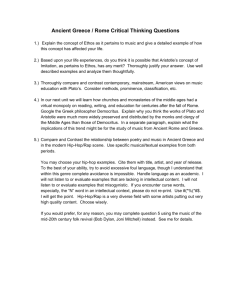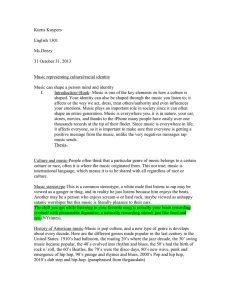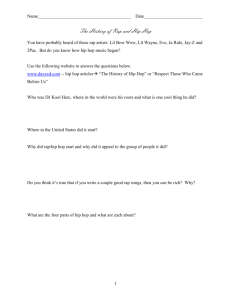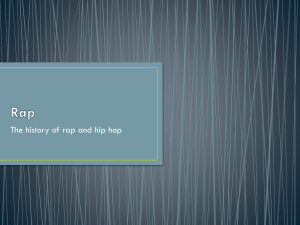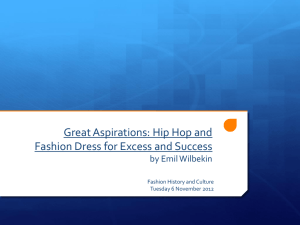ENGL 237 Gentry Sp12 syllabus - Geneseo Wiki
advertisement
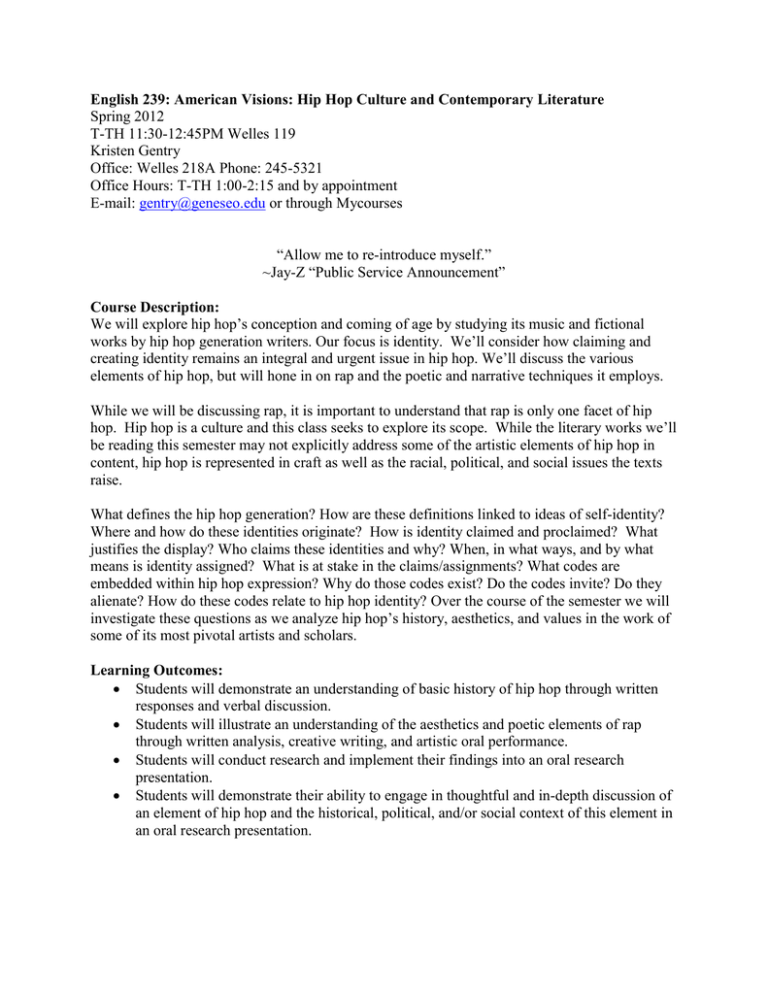
English 239: American Visions: Hip Hop Culture and Contemporary Literature Spring 2012 T-TH 11:30-12:45PM Welles 119 Kristen Gentry Office: Welles 218A Phone: 245-5321 Office Hours: T-TH 1:00-2:15 and by appointment E-mail: gentry@geneseo.edu or through Mycourses “Allow me to re-introduce myself.” ~Jay-Z “Public Service Announcement” Course Description: We will explore hip hop’s conception and coming of age by studying its music and fictional works by hip hop generation writers. Our focus is identity. We’ll consider how claiming and creating identity remains an integral and urgent issue in hip hop. We’ll discuss the various elements of hip hop, but will hone in on rap and the poetic and narrative techniques it employs. While we will be discussing rap, it is important to understand that rap is only one facet of hip hop. Hip hop is a culture and this class seeks to explore its scope. While the literary works we’ll be reading this semester may not explicitly address some of the artistic elements of hip hop in content, hip hop is represented in craft as well as the racial, political, and social issues the texts raise. What defines the hip hop generation? How are these definitions linked to ideas of self-identity? Where and how do these identities originate? How is identity claimed and proclaimed? What justifies the display? Who claims these identities and why? When, in what ways, and by what means is identity assigned? What is at stake in the claims/assignments? What codes are embedded within hip hop expression? Why do those codes exist? Do the codes invite? Do they alienate? How do these codes relate to hip hop identity? Over the course of the semester we will investigate these questions as we analyze hip hop’s history, aesthetics, and values in the work of some of its most pivotal artists and scholars. Learning Outcomes: Students will demonstrate an understanding of basic history of hip hop through written responses and verbal discussion. Students will illustrate an understanding of the aesthetics and poetic elements of rap through written analysis, creative writing, and artistic oral performance. Students will conduct research and implement their findings into an oral research presentation. Students will demonstrate their ability to engage in thoughtful and in-depth discussion of an element of hip hop and the historical, political, and/or social context of this element in an oral research presentation. Course Texts: Adam Bradley and Andrew DuBois, The Anthology of Rap Adam Bradley, Book of Rhymes: The Poetics of Hip Hop Jeff Chang, Can’t Stop, Won’t Stop Junot Diaz, The Brief Wondrous Life of Oscar Wao Jay-Z, Decoded Victor Lavalle, Slapboxing with Jesus William Strunk, Jr. and E.B. White, Elements of Style Additional readings and course material (video links) can be found on Mycourses under the “Course Materials” tab. Bring hard copies of all readings to class on the scheduled discussion days. Additional Requirements: Pen/pencil and paper Note: Unless you have documentation from Tabitha Buggie-Hunt (see the section entitled “Accommodation) stating otherwise, you are expected to take notes for this class using longhand, not typing into a word processing program, and, as stated above, you are to bring hard copies of readings posted on Mycourses, not read from your laptop. Grading Requirements: Participation In-class discussion Online discussion forum Essay 1 Rap performance Essay 2 Final presentation Presentation proposal 20% 10% 10% 10% 20% 20% 10% Unless I specify otherwise, all assignments are to be typed double-spaced in Times New Roman 12 pt. font. I will not accept handwritten work. You will face a penalty of a third of a letter grade for every calendar day assignments are late. For example, if you earned an 85 B on Essay 1, but it was two days late, your final grade will be a 79 C+. Do not e-mail any assignments unless you have received my permission to do so. Carving enough presentation time for such a large class is a tedious scheduling issue so if you miss the assigned date for your presentations you will not be able to reschedule and will receive a zero due to incompletion. If you have a scheduling conflict, speak to me in advance so something can be arranged. Participation It is your responsibility to come to class regularly and in a timely manner No extra credit make up work will be given to substitute for any form of participation. . In-class participation entails being fully engaged in course discussion and you can’t be fully engaged if you are sleeping, texting, listening to your MP3 player, reading non-course related materials, or generally spacing out. If you are caught engaging in non-course related activity during class your final grade will be dropped a third of a letter grade for each incident. If you are tired, sick, or think you will be distracted from participating for any reason, stay home. It’s true that you won’t receive discussion participation points for that day, but you also won’t receive discussion participation points for coming to class and filling a seat. Raising your hand to spew randomness at frequent intervals during discussion for the sake of saying something or simply piggy backing what another student says does not equal excellent participation. A student who exhibits excellent participation will come to class prepared and alert, respond thoughtfully to their peers’ comments, and contribute significantly and daily to our semester long discussion with focused comments and interpretations that illustrate careful reading of the texts through analysis, synthesis, and evaluation of the readings by putting them into conversation with outside texts, earlier readings, previous in-class discussion and relevant personal experiences, demonstrating a willingness to complicate ideas and a desire to reach new levels of understanding. Online discussion forum The definition of excellent participation also extends to online participation via the discussion forum. The discussion forums are another venue for you to share your comments, questions, and analysis of class texts. You are expected to add your voice to this discussion and read what your peers have to say regularly. By the end of the semester you need to have a minimum of twenty posts, contributed on twenty different post days. In other words, do not expect that by posting five times for one post day and five posts on five other days that you have fulfilled this requirement. Given the number of days when we’ll have reading assignments to discuss this means that you can only miss two days of posting and still fulfill the required minimum. The discussion forum is on Mycourses and can be found on the class home page. For the vast majority of the time (if not all of the time) there will be no formal prompts for the forum. Your comments and questions are to be responses to the day’s reading (and sometimes listening) assignments. The forums will be due at 9:30AM every T-TH before class, and they will be dated according to the class day in which the comments correspond. For example, if a forum is dated (and titled) Thursday, January 19, the comments for that forum will be due 9:30AM on Thursday, January 19, and the comments posted will be discussed in class on Thursday, January 19. You will not be able to post comments after the 9:30AM deadline. Please do not send me comments if you miss the deadline; I will not read them and I will not count them toward your required number of posts. The intent of these responses is to get you thinking about the text and preparing for more indepth discussion and consideration of the concepts/issues/characters you’ve just encountered. The forum is the place for you to begin generating ideas, not for you to feel that you have to have everything figured out. Please keep your comments to a maximum of seven sentences. Save lengthier analysis and consideration for class discussion and essays. As with in-class participation, exemplary credit will not be given for random pop-up comments with the obvious intention of announcing your presence on the forum or a portfolio of comments that add up to a chorus of dittos (often submitted right before the post deadline) to classmates’ comments. Mere emoting or ranting about the texts week after week will also not be acceptable. We will be reading material that will draw strong reactions and those reactions are valid and do have a place, but it is imperative that you move beyond the heat of your anger or frustration. Ask yourself why you’re feeling this way. What factors in the text are contributing to this reaction? What led to those factors? How did they originate? Can those factors be changed? How? It is great to ask questions and admit moments of confusion, oftentimes others may be experiencing the same uncertainty and this opens the conversation. However, if these moments of confusion become a continual theme of your comments I suggest that you come see me during my office hours. Friendly critical debate is fine, but the discussion forum will not be the place for you to settle personal vendettas. If you’ve found outside material (songs, news clips, videos, movies, articles) that are valid and can add depth to the conversation, please share them providing titles, authors, and links. I will be reading the forum (though not commenting, unless necessary to remedy any of the aforementioned cautions) and it will not be uncommon for the forum comments and linked sources to find their way into our class discussion. Writing for the online forum will be informal. This means that the writing is exploratory and you may refer to yourself in the first person. This does not mean that you are to disregard everything you’ve learned about grammar, spelling, and punctuation. Your comments are to follow the conventions of Standard English and should not be filled with the abbreviations and emoticons used when texting. At the end of the semester, you will review your posts and choose the five you feel are strongest, date them, print them, and submit them for a grade. These “greatest hits” posts will be due on the last day of class (Tuesday, May 1). You will be graded on the strength of your comments and your development as a forum contributor over the course of the semester. Accommodation SUNY Geneseo will make reasonable accommodations for persons with documented physical, emotional, or learning disabilities. As early as possible in the semester students should contact the Director in the Office of Disability Services (Tabitha Buggie-Hunt, 105D Erwin) and their faculty to discuss needed accommodation. Plagiarism Every student in this course is expected to submit their original work for each and every assignment. By “original,” I mean the work must be authored by you (and only you) and only for this course. Any referenced sources must be cited1. Failure to do so will be considered plagiarism and handled with academic discipline that will generally lead to notification of the Dean of Students and a failing grade for the course. 1 Some of the ideas for the implementation of the discussion forum originate from Professor Alice Rutkowski. Even though her language is not used verbatim she was used as a source so she needs recognition. Please follow similar procedure in your own writing by citing sources according to MLA style. The syllabus for Professor Beth McCoy’s African-American Migration Narrative course is also referenced in this syllabus. Essay 1 Part 1: Rap Performance You will choose four other students to join you as a group. Each person in the group will be responsible for writing their own 16 bar verse of a collaborative rap song. This song should be composed with an astute awareness of the poetic elements we will have discussed in class. The subject of the song should address the question “Who am I?” and/or in the cases of those who want to emphasize the group, “Who are we?” Identity includes self-definition in the form of personality traits in addition to ties to place, people, things, and values. I strongly suggest avoiding the use of gratuitous cursing, sexual content, and violence. It is highly suggested that you read Bradley’s Book of Rhymes in its entirety, carefully reviewing sections read for class, as you write your rap and prepare for your performance. The information in Bradley’s book will help you compose for the first part of this assignment, allowing you to utilize poetic elements with more awareness and purpose, lending to a richer decoding for the second part of this assignment. It is also highly advised that you find the time to practice with your groupmates before your performance You will be responsible for creating the rhythm (beat) for your song. This may be achieved through beatboxing, performing on a drum or other percussive instrument, producing a beat from a computer program, using an instrumental version of another song, etc. Each group will perform their song before the class in a 5-10 minute presentation with each group member rapping their own verse. Individual performance grades will be based on: Stage presence—Are you fully embodying your persona as a performer? Are you confident, taking command of the stage and your audience? Performance—Are you performing at an audible volume? Are you speaking clearly? Do you remember your lyrics? Are you making eye contact with the audience? Do you remain on beat? Lyrical creativity—Have you successfully included elements like metaphor, concrete detail, allusion, narrative, various types of rhyme, etc.? Is there fresh and innovative wordplay and language? Is there emergence of a distinct style? Content—Does the verse convey a clear message? Does that message maintain clarity and purpose within the larger scope of the song in its entirety? Is it relatable? Is it current? Part 2: Rap Decoding In a 4-page double-spaced essay you will decode your rap by explaining the substance and style in your verse as well as the ways that they influence one another. Every allusion, image, use of alliteration, point of view shift, etc. should have a purpose beyond the simple fact that you thought it would be dope. Explain that purpose as well as the reasons why you’ve chosen to answer the question “Who am I?” in How do you define your style compared to other rap artists? Read Jay-Z’s Decoded for insight about how to explain your diction, wordplay, connections between style and substance, why your subject is important, etc. In his book, Jay-Z presents his explanation in short, separate paragraphs, but your essay is to be formatted in traditional coherent fashion with an introduction, transitions between paragraphs, and a conclusion. *Include a copy of your verse at the beginning of the essay. Essay 2 In this 5-6 page essay you will read Connie Porter’s novel Imani All Mine and address the following: What does Porter’s novel contribute to the lit hop discussion? What message about hip hop is conveyed through the content and/or in the novel’s presentation? What is the significance of that message? Look beyond the obvious. Hip hop is about being eons past everyone else in style, slang, and ideas. Our in-class and online discussions are important spring boards for ideas that can be used in your essays, but they are meant to be starting points, hors d’oeuvres, not all five courses. I do not want you relying solely on ideas offered during discussion in your essay. In other words, don’t merely regurgitate what someone else has already said, or perhaps what you have already said, in class or on the forum in your essay. Imagine this essay as your entrance into one of hip hop’s word wars. Choose quality over quantity. Many students try to push a lot of ideas on the page in efforts to fill space. I don’t want you to fill space; I want you to have something to say. If what you have to say is important enough, uncovering the depth of that something will give you plenty to say. Write an essay that leaves me no choice, but to crown you the winner. I strongly advise you not to wait until the eleventh hour to begin reading and brainstorming. Start early so that you have time to create and develop a strong, focused thesis statement that will provide a guide for the remainder of the essay. This thesis statement should evolve over the course of the essay, meaning that the conclusion of the essay should be a culmination of its development, not a final paragraph that mimics the introductory paragraph in idea and language. The conclusion should answer a final “So what?” about what you’ve said throughout the body of the essay. Final Presentation Your final project requires that you explore one of the five elements of hip hop (rapping, graffiti, breaking, DJing, knowledge) in-depth and illustrate how your study of this element has allowed you to decode something about hip hop in a ten-minute presentation. Your exploration must include the incorporation of at least three credible sources (beyond the course texts) about your topic. Books and academic journals are, obviously, great as sources, but think beyond the logocentric. Find and interview experts on your topic, become their mentee. For example, if you choose graffiti as your focus you could read The History of American Graffiti, look up a couple of journal articles, and contact a member of a local graffiti crew or someone who has been doing graffiti art for at least three years. Draw a couple of pieces. Your presentation could include displaying your work, charting its progress, and discussing what you learned about graffiti through your mentor and personal involvement. If you choose one of the four more creative elements, it’s not necessary for you to include performance in your presentation, but it is necessary for your research to include an attempt at graffiti, breaking, or DJing. (Everyone will experience rapping as part of the first major assignment.) It’s hard to truly understand something unless you’ve experienced it in some way. This experience lends to the decoding. If you’ve chosen one of the creative elements, but don’t want to develop skills as an MC, DJ, breakdancer, or graffiti writer, your research should explore a specific facet of the element. For example, a student who chooses DJing may decide to focus on uncovering the difference between old school DJ techniques and more recent techniques that employ current technology, the DJ’s current role in hip hop, etc. Someone who chooses rapping as their focus may concentrate on a specific rap artist and their influence on hip hop, Southern rap, etc. Choosing knowledge as your element allows you to explore the hip-hop related topics that aren’t exclusive to the original four elements. For example, you may be interested in hip hop and activism and decide to research ways that people who identify themselves as members of the hip hop generation are responding to and foresee their involvement in the upcoming election. If you’re curious about the role of law enforcement in urban neighborhoods, you can contact the police department to spend a shift with an officer. You may research the role of the video vixen or beef between artists. You may target hip hop sartorial style and its transformation over the years and investigate what those changes mean or you may continue to explore hip hop and literature by diving into street/urban lit titles. Know that choosing knowledge as the element does not exclude you from engaging with your topic in a personal and creative way. If you’ve chosen hip hop lit as your focus, you may choose to write a short story mimicking an author’s style or creating your own. The possibilities are endless. You may be as creative as you wish in presenting what you discover. You may include a brief exhibition, performance, or reading. You may document your experience and findings through photographs or a short film. Whatever you choose, please find a way to engage your audience. Make contact. Remember, this is about hip hop. Nothing is more boring than listening to a monotone voice, hidden behind a sheet of paper, mumble-rushing through words. Around mid-semester, you will submit a 3-page double-spaced proposal for your presentation that explains what you’ve chosen as your focus and why, as well as your plans for the presentation. This proposal should also include information about work completed thus far for the presentation, work that must be done, a list of sources that you plan to consult and/or sources that you’ve already consulted and why you think that source would be/is valuable for your presentation. Course Schedule *All readings are to be completed by the assigned date. Readings and assignments may be added or removed as necessary. You are expected to check Mycourses regularly to be prepared for any important updates to the schedule. We may not explicitly discuss everything that you’ve read, heard, or viewed but everything has been carefully chosen to further your understanding and build a foundation and you will be held responsible for that information. Week 1 T 1/17 Course introduction Th 1/19 Can’t Stop, Won’t Stop—“Necropolis” 10-18, “Making a Name” 67-85, The Anthology of Rap—“The Message” Grandmaster Flash and the Furious Five, Book of Rhymes—“Rap Poetry 101” Week 2 T 1/24 Can’t Stop—“Soul Salvation” 89-107, “Furious Styles” 111-114, “The World is Ours” 127-134, Anthology of Rap—“Rapper’s Delight” Sugarhill Gang, Book of Rhymes—Ch. 1 “Rhythm” 3-26 Th 1/26 Can’t Stop—“What We’ve Got to Say” 231-250, “The Culture Assassins” 299-322, Anthology of Rap-- “Fight the Power” and Public Enemy “Fuck tha Police.” Book of Rhymes-Ch. 1 “Rhythm” 27-47. Week 3 T 1/31 Anthology of Rap—Eminem “The Way I Am.” Book of Rhymes—Ch. 2 “Rhyme” 49-83 Th 2/2 Can’t Stop—“Gonna Work it Out” 368-371, “All in the Same Gang” 387-392. Decoded— “Negative Space” and the decoding the second verse of “99 Problems." Anthology of Rap-- “99 Problems” Jay-Z Week 4 T 2/7 Can’t Stop—“Becoming the Hip Hop Generation” 415-426, “New World Order” 439-455. Anthology of Rap—“I Used to Love H.E.R.” Common, Book of Rhymes—“Ch. 3 Wordplay” 85117 Th 2/9 Book of Rhymes—Ch. 5 “Storytelling”157-174.” Decoded—“Cautionary Tales” and “Fallin’” Week 5 M 2/13 Essay 1 is due on your performance day. Groups 1, 2, 3, and 4 perform. *Poet and performance artist Saul Williams visits Geneseo for the Hip Hop Symposium. T 2/14 Geneseo’s Hip Hop Symposium continues Th 2/16 Groups 5, 6, and 7 perform. Week 6 T 2/21 Slapboxing—“Raw Daddy.” Mycourses: “On Lit Hop” Adam Mansbach, Book of Rhymes—Ch. 6 “Signifying” 175-203 Th 2/23 Slapboxing—“Ghost” and “Getting Ugly” Week 7 T 2/28 Slapboxing—“Slave” and “Ancient History.” Decoded—“I Will Not Lose” Th 3/1 Slapboxing—“Chuckie” and “Trinidad.” Week 8 T 3/6 Slapboxing—“Who We Did Worship” and “How I Lost My Inheritance” Th 3/8 Slapboxing—“Pops” and “Kids on Colden Street.” Decoded—“Meet the Parents.” Presentation proposal due. Week 9 T 3/13 Spring break Th 3/15 Spring break Week 10 T 3/20 Slapboxing—“Class Trip.” Mycourses. “The Short Happy Life of Francis Macomber.” Th 3/22 The Brief Wondrous Life of Oscar Wao—Introduction and Ch. 1 Week 11 T 3/27 Wao—Ch. 2. Th 3/29 Wao— Ch. 3 pp.77-118 (or to the section titled “The Gangster We’re All Looking For”) Week 12 T 4/3 Wao—Ch. 3 conclusion. Anthology of Rap—“Interview with a Vampire” Ras Kass Th 4/5 Wao—Ch. 4. Anthology of Rap—Immortal Technique “Dance with the Devil.” Week 13 T 4/10 Wao— Part II Intro and Ch. 5. Decoded—Part 3 intro: “Politics as Usual” Th 4/12—Ch. 6 pp. 263-293 (or to the section titled “Oscar Gets Beat”). Anthology of Rap— “Tennessee” Arrested Development. Week 14 T 4/17 Great Day—No class Th 4/19 Wao conclusion. Week 15 T 4/24 Presentations 1-6 Th 4/26 Presentations 7-12 Week 16 T 5/1 Presentations 13-18. Online discussion forum and Essay 2 due. The remaining presentations will be conducted during the final exam period on Thursday, May 3 from 12:00PM to 3:00 PM. Even if you have already given your presentation, you are expected to attend the final exam period to support your peers.
